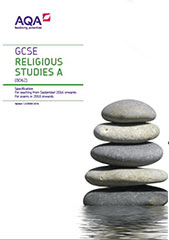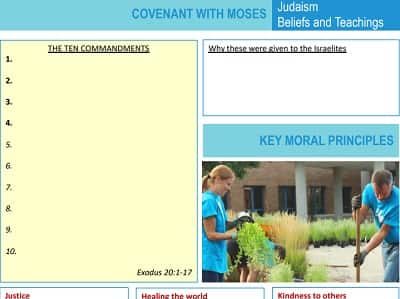JUDAISM BELIEFS & TEACHINGS
Moses & Key Moral Principles
-
The Covenant at Sinai and its importance including the role of Moses and the Ten
Commandments. -
Key moral principles including justice, healing the world, charity and kindness to others
‘I am the Lord your God, who brought you out of Egypt, out of the land of slavery.’
Exodus 17:1-17
‘Let justice roll on like a river, righteousness like a never-failing stream.’
Amos 5:24
Covenant with Moses
Give two of the Ten Commandments. (2)
2021
You shall have no other gods before me / You shall not make for yourself an idol … shall not bow down to them or worship them … / You shall not misuse the name of the Lord your God (swear falsely by the name of the Lord your God) … / Remember the Sabbath day by keeping it holy … / Honour your father and your mother … / You shall not murder (kill) / You shall not commit adultery / You shall not steal / You shall not give false testimony (bear false witness) against your neighbour / You shall not covet your neighbour’s wife / You shall not covet your neighbour’s goods.
Explain two ways in which the Ten Commandments influence Jews today. (4)
Spec 2
the Ten Commandments must be obeyed by Jews/this shows that Jews are following God’s rules for his people/Jews are expected to learn and do God’s will to show that they are observing the faith/ Exodus 19:8 states, ‘All that the Eternal has spoken, we will do’ etc
the Ten Commandments gives Jews their identity/the Commandments describe the Jews’ relationship with God/the observance of Shabbat makes Judaism different from other faiths/ based on the call to reflect God’s holiness, etc
the Ten Commandments shows Jews how to live an ethical life/the Commandments demand standards of behaviour from Jews/about how they treat other people/conduct themselves in their community/ as well as wider society, etc.
‘The Ten Commandments are the most important part of the Sinai Covenant with Moses.' (12)
2020
Arguments in support
• Decalogue / first ten of all the mitzvot / form the foundation of Jewish ethics, religious and civil law / so must be most important as without proper foundations, nothing else lasts or is strong.
• Many of the Ten Commandments underpin laws in society, for instance do not steal or kill are laws in most societies.
• Ten Commandments have prominence in every synagogue / shows importance of these ten mitzvot / provide a summary of all other mitzvot combined.
• Ten Commandments were the only part of the covenant which God inscribed / more than once / done in stone, which implies their fixed and rigid nature/ and their eternal nature / shows they must not be forgotten or ignored, etc.
Arguments in support of other views
• The laws only have value because the Israelites agreed to keep them / so the most important part of the covenant was the assent of the Israelites / their faith made the Ten Commandments more than just words / brought Ten Commandments to life.
• God promised the Israelites would be God’s chosen people / gain special status amongst all nations / thus giving a role to them / this role included them having to keep the commandments, but the role precedes the action.
• God gave Moses all of the mitzvot / not just the Ten Commandments / all are binding so are more important / the Ten Commandments are just the overview rather than the detail / Jewish people need to know the detail.
• The covenant blessed the Israelites / Judaism places great emphasis on receiving God’s blessing / eg Amidah (standing prayer) / so this is the most important part of the covenant / as it is the outcome of observing the commandments, etc.
Key moral principles
Give two of the key moral principles of Judaism. (2)
Spec 1
Justice/healing the world/kindness to others/charity/saving a life.
Give two ways in which Jews might follow the moral principle of healing the world. (2)
2022
Contribute to social justice and a better community / protect the environment / credit specific examples of what a Jew might do to protect the environment / repair the world (Tikkun Olam) / support charities that help those living in poverty / do charity work to help those in need / obey the mitzvot / become closer to God / help to sustain the world God created / keep Shabbat in order to renew efforts to bring about a better world / pray for harmony / unity between nations / no hatred / be kind to others / Love your neighbour / engage in political action for justice / humanitarian work, etc.
Explain two ways in which belief in healing the world influences Jews today. (4)
2020
• Tikkun Olam is healing the world / world repair / role of stewardship given as duty by God / Genesis 1:26 / responsibility to heal, restore, change bringing it closer to the harmonious state for which it was created / ie fix the world.
• Concept found in Mishnah / doing something because it helps create social harmony and a better community / not because it is a law to do so / gave extra protection to the disadvantaged.
• Ethical Mitzvah / Jews have a duty to make the world better for everyone / not just self.
• Aleinu prayer includes hope for the whole world believing in one God / interpreted to mean healing the world / as it is telling humans to physically heal the world, help others and allow goodness of God to shine through.
• Links to belief in Messianic Age / one interpretation of that is that when world is repaired, Messianic Age begins / encouraging healing the world to bring that day nearer.
• Healing the world implies that whilst the world is innately good / God deliberately left room for humans to improve upon his work / Midrash – All that God created, he made to be improved / believing this might make a person more determined to heal the world.
• Leads to social action programmes / tzedakah and acts of kindness.
• Given there are huge issues in the world, eg climate change / belief in healing the world might give motivation that a person should work to fix this problem / as individual or as group / eg by managing own lifestyle / or by raising awareness in others / joining campaigns.
• Might encourage a person to work to right injustices in the world / ie focusing on people not nature / hoping to unite people / bring harmony.
• Some Kabbalistic Jews believe the world is profoundly broken / can only be fixed by human activity which is entirely focused on religious devotion / eg study of scriptures, etc.
Explain two Jewish teachings about charity. (5)
2018
Jews are expected to act with righteousness / they must act out this righteousness in the way that they treat others, including those living in poverty / they must treat others with dignity / act as if a person living in poverty is their brother / deal with those living in poverty with mercy / the highest form of charity suggested by Maimonides is charity which is given anonymously and aims to make a person self-sufficient for this reason
Jews are expected to give 10% of their disposable income to charity (tzedakah) / this is because Jews were instructed in Numbers 18: 26 ‘You must present a tenth of your tithe as the Lord’s offering’ / Deuteronomy 14:22 states ‘Be sure to set aside a tenth of all that your fields produce each year’ / in ancient times farmers would leave the edges of their fields during harvest for the poor to use as food / Deuteronomy 26:12 states ‘When you have finished setting aside a tenth of all your produce in the third year, the year of the tithe, you shall give it to the Levite, the foreigner, the fatherless and the widow, so that they may eat in your towns and be satisfied’
Tikkun Olam requires Jews to heal the world / some interpret this as redistributing wealth
If a Jew is unable to give money, they are expected to give in other ways / many Jews volunteer their time in helping the needy in the community / volunteering in soup kitchens / as visitors to the elderly Teachings may include – Proverbs 19:17 states ‘Whoever is kind to the poor lends to the Lord and he will reward them for what they have done’ / Deuteronomy 15:7-8 states ‘If anyone is poor among your fellow Israelites in any of the towns of the land the Lord your God is giving you, do not be hard-hearted or tight-fisted toward them. Rather, be open-handed and freely lend them whatever they need’ / Proverbs 21:13 states ‘Whoever shuts their ears to the cry of the poor will also cry out and not be answered’ / Proverbs 31:8-9 states ‘Speak up for those who
cannot speak for themselves, for the rights of all who are destitute. Speak up and judge fairly; defend the rights of the poor and needy’, etc.
‘The moral principle of justice teaches Jews all they need to know about the way they should live.’ (12)
2021
Arguments in support
The moral principles as outlined in the specification are justice (tzedakah), healing the world (tikkun olam), charity and kindness to others (chesed).
• When taken together, the moral principles cover important aspects of behaviour that would produce a better society / that lives by God’s wishes / and that follows his teachings / justice plays a large part in this.
• Justice brings about what is right and fair which is essential in society / nothing in society is more important than this.
• The Law and Prophets emphasise the importance of justice / justice should be merciful.
• Justice should not be ignored as injustices bring suffering / if there is no suffering, other moral principles are not necessary.
• Justice comes from obeying the Torah laws.
• Using wealth gifted to them by God charitably by helping the poor brings justice.
• ‘Let justice well up like a river’ (Amos 5:24) / ‘do justice…love goodness’ (Micah 6:8) / ‘Turn from evil and do good; seek peace and pursue it’ (Psalm 34:14), etc.
Arguments in support of other views
Reference to other principles, eg Pikuach Nefesh and sanctity of human life, should be
considered as evidence towards an alternative point of view and must be credited as such, even if presented as one of the moral principles.
• Healing the world is an action that draws people closer to God / the world can be healed by adopting right thought and actions to others / motivates Jews into acting to increase social justice / causing people to suffer fewer injustices / and protect the environment / brings the Messianic age closer / prayers are offered daily for the harmony of nations and uniting of people / encourages Jews to present themselves as a good example of trying to change the world for the better by following the mitzvot / keeping Shabbat provides a day of renewal to help to bring about a better world.
• Being kind to others is required in the Torah and following the Torah results in greater kindness / kindness should not just be shown to Jews but to every living thing / God shows loving kindness to all his people so his example should be followed / prophet Micah said showing loving kindness is better than just doing it / focus is unrestricted but mainly on personal service, personal attitudes and efforts from the heart / ‘Love your fellow as yourself’ (Leviticus 19:18) / ‘The stranger who resides with you shall be to you as one of your citizens; you shall love him as yourself, for you were strangers in the land of Egypt’ (Leviticus 19:34), etc.
• Although the moral principles are very important, other moral teachings should be put alongside them.
• Pikuach nefesh and the sanctity of life show how important life itself is and how it must be preserved and protected.
• The Ten Commandments and the mitzvot are the basis of Jewish moral teaching including the moral principles / come from God so must be of crucial importance / they cover all aspects of life and if observed, they ensure Jews live as God requires them to.
• Religious observance goes alongside the moral principles as they support each other / observing festivals and taking part in worship shows their love for God in a different way from how the moral principles do.
• All aspects of Jewish life, both moral and religious are important and they all show the best way to live if taken together.
• Missing out some aspects of being Jewish by only focusing on certain principles gives an incomplete picture of the way a Jew should live.
• The Shema puts the love of God before the love of your neighbour although this does not necessarily show that it is more important, etc.
The Ten Commandments
Lesson slides: The Messiah, Messianic Age, and comparing and contrast Orthodox and Reform interpretations about the Messiah
The Key Moral Principles
Lesson slides: God’s promise to Abraham, God’ requirements of Abraham, and how the covenant is understood today

Moses
A short version of the story of Moses and the impact of the covenant that he made with God explained







